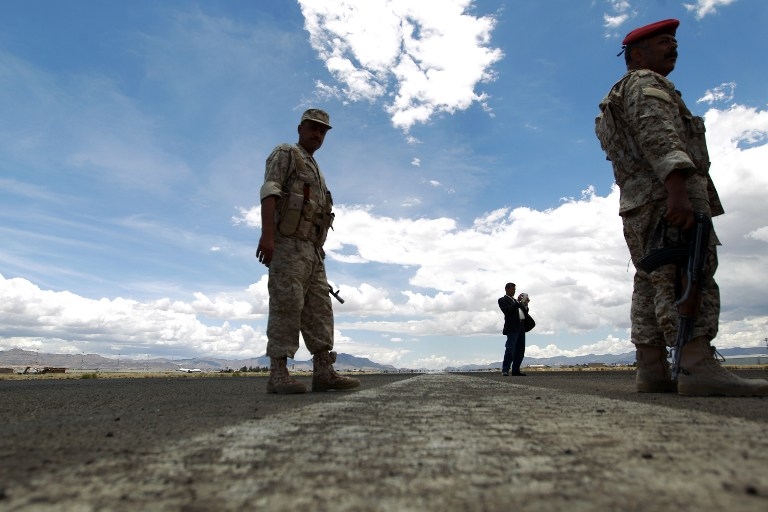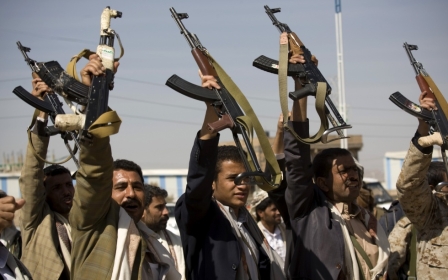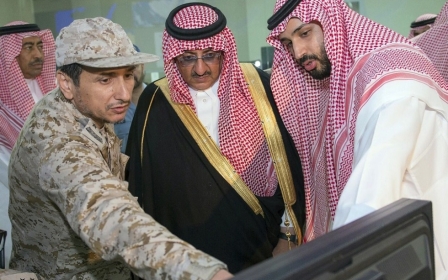The war in Yemen is splitting us

Last week, after finishing my morning lectures, I called my family in Yemen – a daily routine since the escalation of the conflict last month.
“Most of the windows in the house are shattered. But the Saudis have stopped [striking] for now,” my dad said. “Oh, wait, I was wrong. They’re at it again.”
Except, they weren’t. The "pounding" my father was hearing was my nine-year-old brother in the next room beating cushions with his fists as he imitated the sound of airstrikes.
Ever since a Saudi-led coalition launched "Operation Decisive Storm" - a bombing campaign that aims to reinstate President Abd Rabbu Mansour Hadi and push back Houthis rebels – I have been struggling to sleep. Caught between two time zones, the gulf between my life as a university student abroad and that as an activist watching my country fall apart, widens every day.
Sometimes I wonder if President Hadi, who fled to Saudi in March and backs Decisive Storm, himself feels torn. Last month Hadi published an op-ed in the New York Times from his safe house in Riyadh asserting that the Houthis, Shiite rebels allied with former president Ali Abdullah Saleh, “must be stopped.” This is a sentiment that most Yemenis share, especially those living in the south, where hundreds have died in brutal clashes with Houthi rebels.
Hadi said that the Houthis have committed “unjust acts of aggression against the Yemeni people”. He is right.
After seizing the capital last year, the Houthis ran riot: kidnapping journalists and politicians, occupying schools and hospitals and attacking protesters with guns and knives. Houthi militias have reduced neighborhoods to rubble and gunned down civilians in the street. In a country where 60 percent of the population depends on humanitarian assistance, Houthi fighters block organisations like the ICRC from delivering aid.
But while Hadi condemns one set of atrocities in Yemen, he closes his eyes to another: Operation Decisive Storm, a broad, open-ended war waged from the skies, is also an indiscriminate campaign.
The bombs dropped on Yemen may be directed at Houthi positions, but all too often they crash into houses and schools. More than 1,000 have been killed since March 23 and over 4,000 injured, according to the World Health Organisation (WHO).
Saudi-led strikes are responsible for hundreds of those deaths, including 46 people in Sanaa, 40 civilians at an IDP camp, 30 residents in Hodieda, dozens of employees at a dairy factory, 9 family members in a village, and 3 children at a school.
As a friend in Sanaa told me recently: “Missiles are falling on us like rain.”
Over 300,000 people have been displaced, many of those fleeing to villages to escape Houthi assaults or airstrikes pounding the cities. An air and naval blockade instated by the coalition, which for weeks prevented the country’s international airports from operating and vital aid from getting to those in need, has brought Yemen’s economy to its knees. Hospitals are overwhelmed. Bakeries have no bread. Thousands of vaccines for preventable diseases have been thrown away because fuel, powering the refrigerators they were kept in, ran out.
This week airstrikes hit the runway of airports in Aden, Hodieda and the capital, Sanaa, closing off a critical channel for humanitarian aid to a country highly dependent on food imports. Saudi Arabia promises to alleviate suffering as it airlifts weapons - not aid - into the country.
In his op-ed, Hadi said that Arab and international support had "pulled Yemen back from the brink". The opposite is true. Rather than uniting us toward peace, the war is splitting us. Positions are hardening. Faced by Houthi aggression from below and Saudi-led attacks from above, Yemenis are being forced to pick a side as the middle ground (opposing both) quickly vanishes. Meanwhile a power vacuum grows, profiting al-Qaeda’s affiliate in the Arabian Peninsula (AQAP).
As the war rages on I will continue to live between two time zones. Occasionally, those time zones intersect: I awake with a start to a crashing outside only to realise it’s a garbage truck in the street, not an airstrike.
Unfortunately, my family and the rest of Yemen do not live between two time zones; they live between life and death. Yemen must be saved. It is under siege. If both parties in the conflict continue beating the drums of war, it will soon be too late to stop the country’s destruction.
Ruba Aleryani is an aspiring writer and photographer born and raised in Sanaa, Yemen. She is currently an undergraduate at Brown University studying Development and Middle East Studies.
The views expressed in this article belong to the author and do not necessarily reflect the editorial policy of Middle East Eye.
Yemeni soldiers inspect the damage done by air strikes of the Saudi-led coalition on the tarmac of the rebel-controlled international airport of Sanaa on May 5, 2015 (AFP)
Middle East Eye propose une couverture et une analyse indépendantes et incomparables du Moyen-Orient, de l’Afrique du Nord et d’autres régions du monde. Pour en savoir plus sur la reprise de ce contenu et les frais qui s’appliquent, veuillez remplir ce formulaire [en anglais]. Pour en savoir plus sur MEE, cliquez ici [en anglais].




